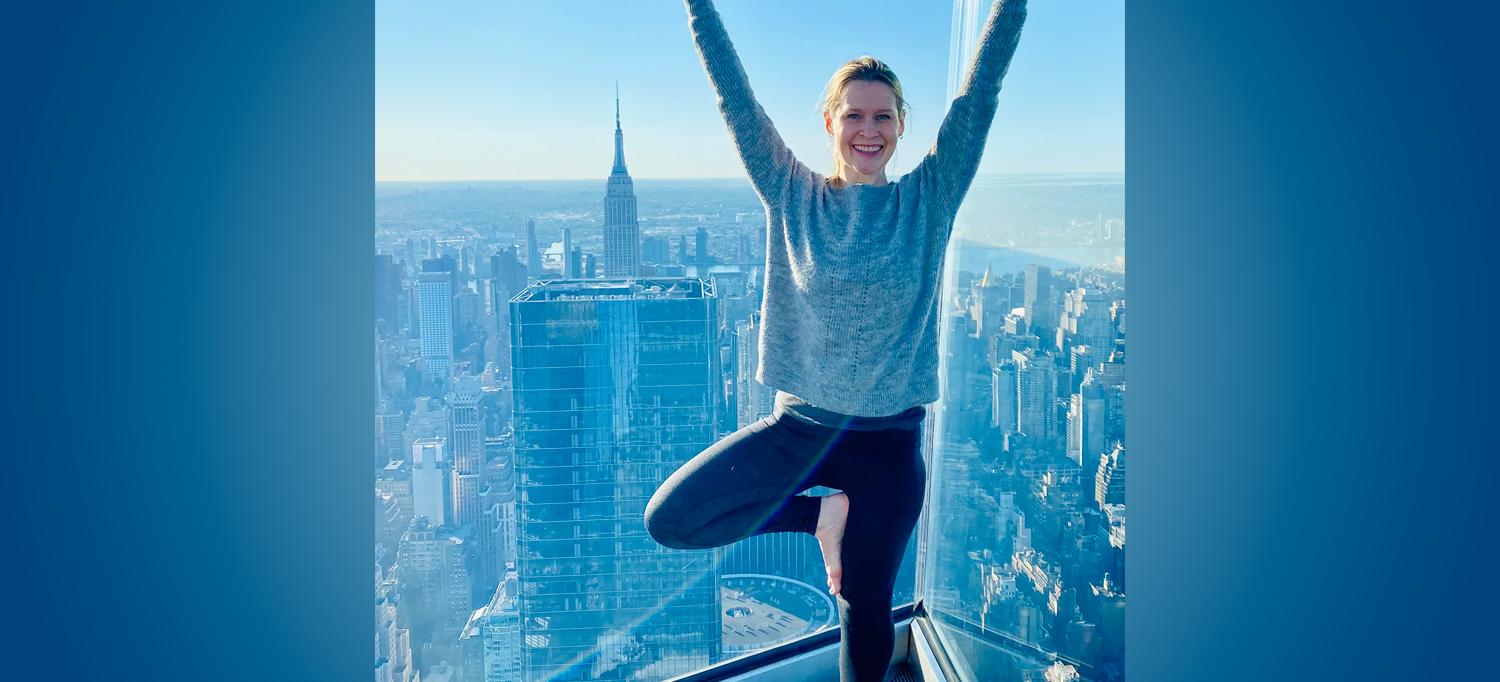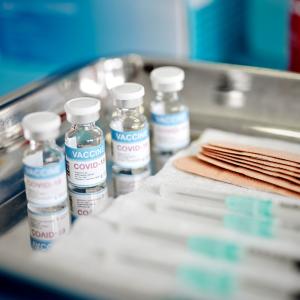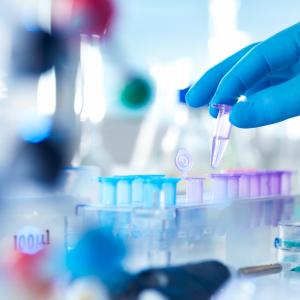
Meet Melissa Honkanen, who two years ago was the first participant in NYU Langone’s COVID-19 vaccine study.
Photo courtesy of Melissa Honkanen
In May of 2020, Melissa Honkanen became the first participant in the world to be vaccinated in the Pfizer–BioNTech coronavirus vaccine study, kicking off a double-blind trial at NYU Langone. The study helped launch the massive international vaccination effort that has hugely reduced rates of hospitalization and death as a result of SARS-CoV-2 infection. Among NYU Langone’s Vaccine Center staff, Honkanen has another claim to fame: the only patient to have done yoga in her visit room.
Honkanen is a yoga instructor who first learned about the trial from her husband, the former director of pediatric neuro-oncology at Hassenfeld Children’s Hospital at NYU Langone, who was working in the hospital during the early stages of the pandemic.
“I was just a New Yorker trying to figure out what was going on while I was teaching yoga online,” Honkanen says. “My husband asked, do you want to join this? I thought, yeah, this is a no-brainer for me. We’ve got to do something; this is not a sustainable life that we have.”
“I was just a New Yorker trying to figure out what was going on while I was teaching yoga online,” Melissa Honkanen says. “My husband asked, do you want to join this? I thought, yeah, this is a no-brainer for me. We’ve got to do something; this is not a sustainable life that we have.”
Honkanen, who had enrolled in a clinical study through Johns Hopkins in her undergraduate years, and had worked as a paralegal for more than 10 years, felt prepared to read through the consent documents herself and was comfortable with the procedures of enrollment. She also had another advantage: She spoke extensively with her husband about messenger RNA (mRNA), the basis of the new vaccine platform being tested.
“At the time my husband said that cancer researchers had been working with mRNA for a few years, and unfortunately the treatments hadn’t proven effective, but it also hadn’t been harmful. I went in with that knowledge. The people who joined this trial who didn’t have the same information I had, whether from a doctor in the family, or a friend—those people, I commend them.” But even with her relative familiarity with the platform, Honkanen was nervous on the day of her first vaccine dose. “I hate needles,” Honkanen says. “I was also nervous to go into a hospital because I knew there would be people with COVID-19 there, and I knew people working with COVID-19 patients would be there.”
Thus, the yoga. After receiving the first dose, the initial participants of the study were asked to wait under observation to ensure there was no allergic response for four hours. While she waited, Honkanen practiced yoga to clear her head and pass the time. “She was the perfect first patient,” says Marie I. Samanovic-Golden, PhD, program director of the Vaccine Center. “She kept us very calm—we all loved her.”
“She was the perfect first patient,” says Marie I. Samanovic-Golden, PhD, program director of the Vaccine Center. “She kept us very calm—we all loved her.”
Honkanen has now been enrolled in the study for more than two years. She says it has been interesting to watch the Vaccine Center become more streamlined as it grows, and she is grateful to all the people who have led her through the process from the beginning. “Dr. Mark Mulligan [director of the Vaccine Center and principal investigator on the study] was so careful and thorough,” she says. “I felt so supported by him and what he coordinated. The team was helpful: They were so careful to answer my questions, to chit-chat with me during the four to five hours after my shot. I get a little emotional—I saw them more in the first year of this trial than I did anybody else besides my husband. I felt comfortable after a while. I felt taken care of.”
Although percentages vary state by state, approximately 77 percent of Americans have now received at least 1 dose of a COVID-19 vaccine. Vaccine hesitancy remains a concern, but the resistance can be partially mitigated when trusted friends, family members, or community spokespeople receive the vaccine. Honkanen knew that as the first patient in this study, she would be a very visible spokesperson for vaccination. She posted numerous updates on Facebook and Instagram—joking that “the green spots went away…eventually”—and spoke about her experience to news outlets. She says, “I wanted people to feel that I was a trustworthy person.”
Honkanen is still following the results and updates from vaccine studies being conducted at NYU Langone and elsewhere. When asked if she was surprised by anything about the study, she said: “My biggest surprise is that it worked! I went into this trial thinking, even if it doesn’t work, at least we’ll learn something.” When it became clear that the mRNA vaccines were extremely effective—approximately 70 percent effective at reducing hospitalization during the Omicron-predominant period—it took her a while to believe it.
Honkanen feels extremely humbled to have participated in the clinical trial and continues to be grateful for the Vaccine Center for all their hard work during the pandemic. She is also immensely thankful that the mRNA vaccines are as effective as they are. And at the Vaccine Center, she will always have a special place in the story of the early vaccine trial days: the first vaccinee and the first to do tree pose and sun salutations in the visit room.
Vaccine Center research scientist Alison Gilchrist, PhD, interviewed Melissa Honkanen for this piece.

